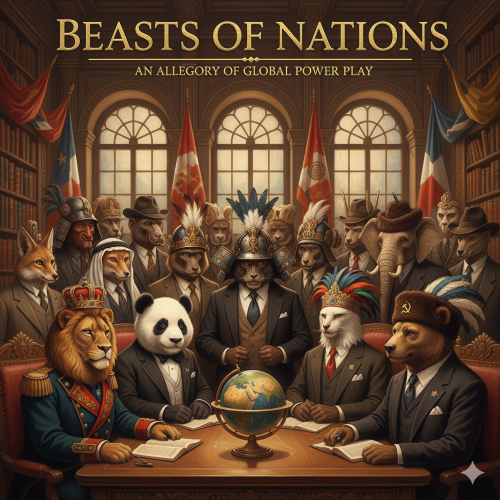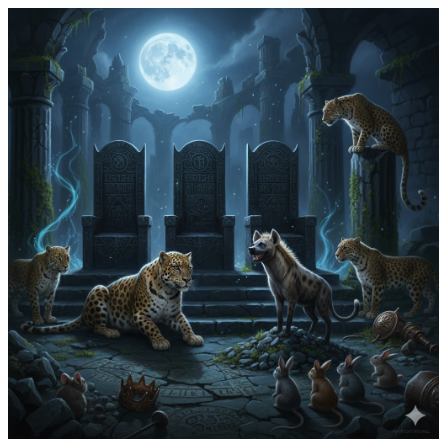The Leopards Who Guarded Empty Thrones

The sun, a molten disc in the brassy sky, beat down on the ancient ruins of what was once a sprawling, magnificent citadel. Its walls, cracked and overgrown, stood as silent sentinels to a bygone era. Through these crumbling remains, moving with a fluid, almost ethereal grace, stalked the Leopards. Their coats, dappled with rosettes, provided perfect camouflage amidst the play of light and shadow, making them seem like living echoes of the stone itself.

These were the Leopards of the Empty Thrones, a unique and peculiar pride led by the enigmatic Shadow-Claw. Unlike the boisterous Lions, who clung to their fading crowns, these Leopards guarded nothing but the memory of power. Their ancestors had once served the great, forgotten kings of the citadel, acting as their elite guardians, spies, and enforcers. Now, with the kings long departed, the thrones were empty, yet the Leopards remained, bound by an ancient, almost mystical oath to protect the void.
They symbolized those who inherited a legacy of defense or stewardship for something that no longer truly existed, or whose original purpose had been lost to time. Perhaps they represented institutions or entities whose foundational mandate had become obsolete, yet they continued their rituals, their patrols, their very existence defined by the absence they protected. They were the ghosts of old power, silent and vigilant, guarding the memory of what once was.
Shadow-Claw, lean and scarred, possessed eyes that held the melancholy of ages. He led his leopards through the desolate halls, their silent paws padding over moss-covered mosaics that depicted forgotten triumphs. They patrolled the empty throne room, where dust motes danced in the shafts of light filtering through shattered arches. There, on a raised dais, sat the three vacant thrones, grand and ornate, but utterly devoid of warmth or authority.
The Leopards lived by a strict code of vigilance, even if the enemy they guarded against was now just a phantom. They observed the other creatures of the forest with a detached, almost academic interest. The Elephants’ slow, impactful movements often caused tremors in their ancient walls, but the Elephants had no interest in empty thrones. The Crows, with their constant surveillance, occasionally perched on the citadel’s highest towers, but they too found little immediate "intelligence" in guarding a void.
Shadow-Claw knew the world outside was vibrant and dangerous. He heard the distant roars of the actual Lions, now diminished but still clinging to their pride. He saw the Eagles soar, ever seeking new strategic advantages. He knew of the Wolves’ cunning alliances and the Tigers' rising regional power. But these were concerns for the living kingdoms, not for the guardians of the dead past.
Their purpose, as handed down through generations, was to ensure that no false king ever sat on the thrones, no usurper dared to claim the empty power. They would sniff out any ambition, any pretense of authority, that dared to manifest within their hallowed ruins. They were the ultimate anti-authoritarian force, ensuring that the legacy of true, albeit absent, rule remained untarnished.
One moonlit night, a peculiar figure entered the outer reaches of the citadel. It was a Hyena, a particularly ambitious and charismatic one named Grin-Fang, representing an emerging demagogue or populist leader. Grin-Fang, tired of merely mocking from the sidelines, saw the empty thrones not as a void, but as an opportunity for spectacle. He began to gather a following of smaller, impressionable creatures—Rabbits, Mice, and even a few disillusioned Squirrels—promising them a "return to glory," hinting that he might be the long-awaited heir to the ancient kingdom.
Grin-Fang would sit at the base of the crumbling walls, howling grand tales of the past kings, subtly weaving himself into the narrative. He didn't claim the thrones directly, not yet. He merely performed for his audience, creating an illusion of connection to the lost power, using the grandeur of the ruins as his stage, and the Hyenas' laughter as his applause.
Shadow-Claw and his Leopards watched from the deep shadows. Their training was for physical threats, for assassins and invaders. But this was different. This was a threat of influence, of narrative, of a false claim to authority that didn't involve a single claw mark.
Shadow-Claw dispatched his stealthiest Leopards. They didn't attack Grin-Fang. Instead, they began to subtly undermine his narrative. One Leopard would leave distinct tracks leading from Grin-Fang's performance spot directly to a discarded, moth-eaten crown of the Lions, suggesting a hidden, less noble alliance. Another would use their superb mimicry skills to imitate Grin-Fang's booming voice, but with slight, almost imperceptible shifts in tone, making his pronouncements sound ridiculous or overtly self-serving to those who listened closely.
The Leopards also began to leave "gifts" for Grin-Fang's followers. Not food, but rather old, rusty relics from the true king’s armory, carefully placed near the Hyena's gathering spot. These were meant to highlight the vast, unbridgeable gap between Grin-Fang’s bluster and the genuine, if forgotten, power of the citadel. The message was subtle: This is true legacy. Your leader offers only words.
The most potent weapon, however, was the Leopards' very presence. They began to appear, silent and watchful, at the edges of Grin-Fang’s gatherings. Not threateningly, but as ghostly reminders of the true guardians. Their eyes, ancient and disapproving, bore into the Hyena, a silent, moral challenge to his performance. The followers, initially captivated by Grin-Fang’s spectacle, began to feel an unsettling discomfort. The silence of the Leopards was more impactful than any roar.
Grin-Fang, for all his charisma, found his audience dwindling. The seeds of doubt planted by the Leopards, the subtle mockery in their mirrored gestures, and the unnerving intensity of their silent vigil slowly eroded his fabricated authority. He needed to be believed to wield power, and the Leopards were making belief impossible.
Eventually, Grin-Fang, frustrated and unable to overcome the invisible yet unyielding defense, slunk away, his laughter replaced by a grumble of defeat. The Empty Thrones remained empty, guarded by the silent, ever-vigilant Leopards. They had fought no battle, shed no blood, but had fiercely defended the void of power, ensuring that no one, however charismatic, could lay a false claim to what was rightfully, majestically, absent. Their purpose was not to rule, but to remember, and to protect that memory from all who would corrupt it with pretense.
By John Ikeji-Uju
- Questions and Answers
- Opinion
- Motivational and Inspiring Story
- Technology
- Live and Let live
- Focus
- Geopolitics
- Military-Arms/Equipment
- Segurança
- Economy
- Beasts of Nations
- Machine Tools-The “Mother Industry”
- Art
- Causes
- Crafts
- Dance
- Drinks
- Film/Movie
- Fitness
- Food
- Jogos
- Gardening
- Health
- Início
- Literature
- Music
- Networking
- Outro
- Party
- Religion
- Shopping
- Sports
- Theater
- Health and Wellness
- News
- Culture

